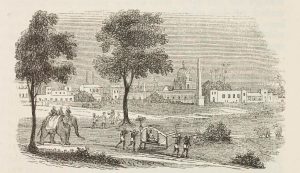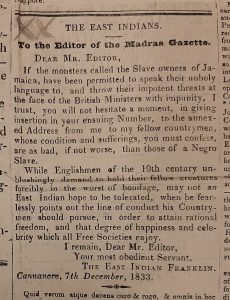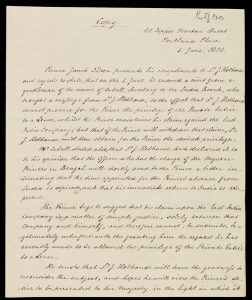January 26, 2022, by Kathryn Steenson
Colonialism in Correspondence: The Letters of Lord William Bentinck
This is a guest post by English student Ben, written as part of his placement with the Nottingham Advantage Award from the UoN Careers and Employability Service.
The letters of Lord William Bentinck, from the Portland Collection at the University of Nottingham, contain many details of the governorship of India in the early 19th century. Much of what I have read in my work to complete the archiving of these letters has concerned the movements of ships, the garrisons of forts, and the health of individuals. It has not been my job to assign value to the details of the letters in my task to read and catalogue them. However, the colonial attitudes and activities of Lord William and his correspondents has stood out to me as having inarguable public value to us now.

Engraved illustration of Madras (now called Chennai), India. From ‘India: pictorial, descriptive, and historical’ by Henry G. Bohn (1854)
Much of the correspondence I have read has been written by Sir Frederick Adam, the governor of Madras [now Chennai]. When talking about the people that he supposedly governs, Adam uses a language that dehumanises his subjects, and makes clear his disdain for the province and the country. He is particularly disinterested in a wave of refugees that come to Madras when a particularly bad season leads to famine elsewhere. He goes on to tell Bentinck that they have been removed by himself, after coming to his province for help. Adam also discusses the practice of the East India Company, and ways in which they are manipulating military and legal matters in India for their own ends. It demonstrates how much influence commerce and capital had at the time, and the perspective of the colonial administrators on the company.
Another particularly enlightening piece of colonial discourse is an issue of the Madras Gazette from December of 1833, kept with Bentinck’s letters. Amongst many advertisements and updates from the garrison of Fort St. George (the newspaper is perhaps unexpectedly preoccupied with military matters), the paper has published a call for revolution. The ‘East Indian Franklin’ makes many promises of violence, and likens the situation to that of slave revolts of the Roman Empire, and the contemporary situation in the West Indies (the act abolishing slavery in the British Empire had been passed just three months prior). It came as a great surprise that the editors of the gazette would choose to publish this for a largely British colonial readership. The writer also makes many criticisms against the editors themselves, who respond with sardonic and sarcastic comments in return. It demonstrates the attitude of the colonial press, in being above dispute and holding the suffering of the colonially oppressed Indians as spectacle for their readers.
Ultimately, these letters provide a personal and insightful perspective into colonial history, and demonstrate attitudes of colonialism in terms of politicians, commerce, and the press that are relevant today. In order to identify and combat the existing (and sometimes implicit) elements of colonialism in our own society, we must understand these attitudes and elements in a time of a time of direct colonial control. Collections of correspondence can provide a fascinating insight into these issues, and perhaps achieve a great deal of public good with the right attention and accountability.
The Papers of Lord William H. Cavendish Bentinck (1774-1839), soldier, politician and statesman, in the Portland (Welbeck) Collection, are available to view in the Reading Room, by appointment. Please contact us on mss-library@nottingham.ac.uk. You can also follow us @mssUniNott on Twitter and Instagram, and for more about our Indian history collection, see our Threads of Empire online exhibition.
No comments yet, fill out a comment to be the first



Leave a Reply